
Arquivo para April, 2015
Idealism or realism, immanent and transcendent
Realism and idealism are two competing philosophies, especially in the field of knowledge and education, from ancient Greece, these theories influence the philosophy of education up to the present day, and you do not know can join them.
and education, from ancient Greece, these theories influence the philosophy of education up to the present day, and you do not know can join them.
The idea is the basic idealism since it focuses on reason and reasoning and it is the way in which a person brings up the knowledge you have within you.
In his view, the world exists mainly in people’s minds and this is ultimate truth so we should have consistency of our ideas.
The more perfect are our ideas (in Cartesian rationalism they should be clear and distinct), the better we can serve, obey and live in the world.
In the idealism of Immanuel Kant, the world exists, but our mind is separated from it and can only perceive it through a transcendent act, that is the transcendent subject.
Realism is the school of educational thought it came from a student of Plato: Aristotle.
The only reality for him is the material world, the study of the outside world is the only reliable way to find the truth; the world is a phenomenon objective to which our mind must adhere in order to transform it.
But make no mistake St. Thomas Aquinas was also realistic and in his time the current that gave rise to modern idealism was called nominalism.
In Realism, a person is an empty vessel of knowledge (called tabula rasa), and this can only come out of being, through observation. This philosophy was the mother of the scientific method, a research system based on objective facts.
This idea of empty knowledge came the discussion of innate knowledge, immanent and transcendent.
Immanence is a religious and metaphysical concept that defends the existence of a supreme being and divine (or force) within the physical world (beyond the physical – meta-physis), this concept generally contrasts or coexists with the idea of transcendence depending on the philosopher and time.
Empiricism and rationalism
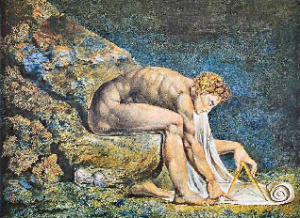 The essential dispute between empiricism, which states that we are dependent on our sensory experience to conquer knowledge, and rationalism which states that the reason independent of experience, at least pure rationalism, is present in the representation of idea, namely that the rational knowledge “a priori” to indicate that it is then independent of experience.
The essential dispute between empiricism, which states that we are dependent on our sensory experience to conquer knowledge, and rationalism which states that the reason independent of experience, at least pure rationalism, is present in the representation of idea, namely that the rational knowledge “a priori” to indicate that it is then independent of experience.
These “tags” universal knowledge of the characteristics are universal, and here rationalism binds to Nominalists while empiricists believe that there is “a priori”, the man is a blank slate (tabula rasa is used by philosophers), and learn experiencing.
The experimentalism came first, with Francis Bacon (1561-1626) renewing Organon, the text on the Nature of Aristotle, for it calls Novum Organum, but lacks critical awareness, which will gradually be built in his disciples to reach David Hume (1711-1776).
It was a philosophical position that resorted to traditional metaphysics, Greek and scholastic, Aristotelian and Thomist, it will be reworked and will be one of the Renaissance impulses.
Between Hume and Bacon, from the historical point of view, Descartes (1596-1650) was a philosopher, physicist and mathematician, his debate with practical issues that judges obscure, writes in a letter to Mersenne, says “Conimbres are long, and good that they were short more (critical since then current even in the Company of Jesus’s schools) and dislikes of the first schools.
In 1619, traveled to United Kingdom and in the opinion of some biographies on 10 November, would have had a vision in a dream of a new mathematical and scientific system, but only in 1637 wrote his Discourse on Method, which are actually meditations.
Later was born in the UK, a philosophical movement that was somewhat the opposite, critical empiricism with John Locke and David Hume, who sees problems in its pure reason and his famous method.
It is the period that arises Isaac Newton (1642) (pictured Divine Geometra of William Brake) and also the final period of the Thirty Years War (1618-1648) that changes the map of Europe.
The idealism of Immanuel Kant (1724-1804) is an attempt to reconcile rationalism and empiricism, he wrote Critique of Pure Reason, but its important work is metaphysics, actually he is the founder of modernity, the little peak will last until Georg Hegel (1770-1831)
A “quarrel” between reason and names
This problem, which comes from classical antiquity, with Socrates,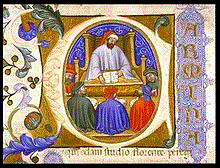 Plato and Aristotle is a problem today for science, or what we consider scientific in the true sense, but the heated dispute in the late Middle Ages, with nominalistic and realistic.
Plato and Aristotle is a problem today for science, or what we consider scientific in the true sense, but the heated dispute in the late Middle Ages, with nominalistic and realistic.
All part of a written Boethius (480-525 AD), in the early Middle Ages, who used a text (univesal quarrel) of Isagoge Porphyry (234-309 AD), see illumination-text side (photo), which stated:
“So he will avoid talking about the genders and species, on the question of whether they are subsistent realities in themselves or only consist of mere mental concepts or are tangible or intangible, or are separate or if there in sensible things and depend on them, since it relates to a matter that requires a thorough treatment and requires more examination.”1
The problem come the middle ages and was instrumental in establishing a first idea of rationalism, through logic and the construction of knowledge, but at the end of the Middle Ages, the so-called low average age the problem almost disappeared.
It was Peter Abelard, a monk who was player of Origen, who restated the thesis as a reinterpretation of the rank of species and genera Porphyry, but said the words (names) describe the world do not refer to the words in the physical sense (the sounds we emit when we speak), but the words as carriers of meaning.
It was through the reading of the writings of Aristotle on the soul and metaphysics, which in the thirteenth century Thomas Aquinas and Duns Scotus developed sophisticated forms of realism, however in the fourteenth century Wilheim of Ockham rejected the Aristotelian idea that intellectual knowledge resulted from the fact that our lie were informed by universal ideas resulting from perceived objects, replaces it with the Ockham’s razor.
Ockham’s razor is the idea that between a simple explanation of a certain thing and another complex, we get the simplest and therefore there is no “universal” that are innate.
For realists, a universal is a predicate being of others (or especially) all other entities. It exists objectively, as much as reality itself, transcendent in relation to the particular (Latin: universal ante rem) or as immanent in the individual things.
1Porfírio. Isagoge. Introduction, translation and notes of Juan José García Norro and Rogelio Rovira. Trilingual edition (Greek, Latin and Spanish). Barcelona: Anthropos Editorial, 2003, p. 2-3.
What is the role of the UN today?
Democracies in crisis, wars spread across the planet, and the role of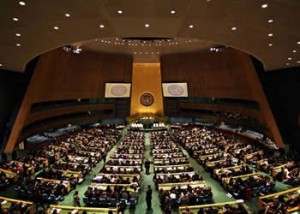 the UN is the only security, many organizations and political organizations think not.
the UN is the only security, many organizations and political organizations think not.
The first UN meeting was held on April 25, 1945 so 70 years ago in the city of San Francisco in the US, with the presence of 51 governments and non-governmental organizations to draw up the United Nations Charter, but went on to be permanently available from of October 24, 1945.
His UN headquarters in New York though, has only four organs in this location, the International Court of Justice is located in The Hague, the Netherlands, and there are other bodies scattered locations across the world.
The current UN Secretary General, is the South Korean Ban Kim Moon, and the organization now has 193 UN Member States and only these states may vote at the UN.
See some of these agencies:
International Labour Organization (Geneva, Switzerland)
International Maritime Organization (London, UK)
International Monetary Fund (Washington, DC, United States)
International Telecommunication Union (Geneva, Switzerland)
United Nations Educational, Scientific and Cultural Organization (Paris, France)
World Food Programme (Rome, Italy)
But his main organ where the political dispute is fierce and where the ideological forces are concentrated is the Security Council,compound by 15 Member States, with 5 permanent members (China, France, Russia, United Kingdom, United States) and the other 10 members are temporary that are changed every two years ago, now are members Austria, Bosnia and Herzegovina, Brazil, Gabon, Japan, Lebanon, Mexico, Nigeria, Turkey and Uganda.
It is time to renew your role, you must create an international solidarity program to promote an end to poverty, prevent dictatorships and oppression, defend the right to education for all and especially to establish tolerance political, religious, gender and cultures.
Hubble, infinite and postmodernity
Twenty-five years ago, exactly on April 24, 1990, the space shuttle Discovery took off to put in orbit an observatory with a telescope Hubble, placed in orbit around the planet, that would change our view of the universe, our physical vision and perhaps the life.
orbit an observatory with a telescope Hubble, placed in orbit around the planet, that would change our view of the universe, our physical vision and perhaps the life.
It was observed points that were previously inaccessible to the human eye and were mysteries for researchers. As the Cat’s Eye Nebula (photo) detected in 2004, a nebula that is 3,000 years light of Earth, a nebula is a sun passing to eject their gases before settling as a solar star. As well as the nebulous Carina, 7500 light years from Earth, formed by gas and dust that allows astronomers to study details of star formation, the photo was captured in 2007.
The Copernican revolution that swept the geocentric vision, idea that the earth was the center of the universe, helped to release the ideal teocêntricos man confused and bring out the science and modernity, which now also are in crisis, but the fact that we see further may cause our myopia is exceeded and we start to look the Other not as an extension of self and the Same, but with equal rights that I.
Since the Third Meditation Cartesian, the philosopher Emmanuel Levinas established in their entirety and Infinite work, there is a break from the category of totality, which is based on the relationship between the cogito and the infinite idea developed in Descartes, and where Levinas extract your project to rethink the relationship between the Same and the Other ethics as first philosophy plan:
“And I do not believe that do not understand the infinite by a true idea, but only by a denial of the infinite .. unlike understand quite obvious that there is more reality in infinite substance than in finite and, therefore, that the perception of infinity is, in a way, me earlier perception of the finite, that is, the perception of God is prior to the perception of myself, for which reason it would give me that doubt, desire, that is, I am needy of something and I’m not totally perfect, if there was in me any idea of a more perfect being by comparison with which I know my faults?” (Descartes, 2004, p. 91-92).
Levinas reflects first about his “doubts everything” that conflicts with the external perception of the infinite idea, since it is no longer the cogito (systematic doubt) you think the infinite, but comes from the “I think” and should be the very idea of infinite substance (now seen by Hubble), the second is inadequate, because the infinite is not an overflow of ideatum, but the external relation that admits the experience with the new, the thoughtless and therefore outside the entirety.
In this infinite “thoughtless” that Levinas says Even the relationship with the other, “without the transcendence of cutting the ties that implies a relationship …” (Levinas, p. 35), and this way Levinas shows how modernity fixed this relationship on the basis of “I think” itself of modern rationalism, and this is the distance between the idea of the Other with ideatum standing in “transcendent being, the infinite is the absolutely other” (Levinas, Totalidade e Infinito, p . 35-36).
It is in this way that separates the infinite idea of Descartes that is the philosophical search for God’s existence, as in Levinas is linked to the search for a relationship between the Same and the Other, to keep the externality of the Other, and not attached to idea Same.
Descartes, R. Meditations on First Philosophy. Sao Paulo-Campinas: Editora da UNICAMP, Campinas, 2004.
Levinas, E. Totalidade e Infinito. Lisbon-Portugal, Edições 70, 1988.
The being, things and values
That being is fragmented, the speech and culture were fragmented in the course of modernity we all know, let’s call it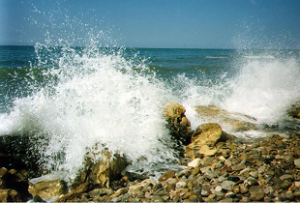 liquid, gaseous or virtual, will not be the characteristic that solve and put back to life and society on track.
liquid, gaseous or virtual, will not be the characteristic that solve and put back to life and society on track.
Recognizing that the public and private spheres are divided and confused when they should not be just looking at the various levels of the “so-called public life” to know that certain estates (not classes) took public account and become private.
The deeper problem is one that separated us or leagues to things, be they money, technology or even intangible things like ideologies, ideas and religions, and we were not in physics, but the meta-physics that was abandoned.
The problem is that intangible things or are not recognized as such, or recognized are separate views of Being (not the subject, fragmentary category of modernity), since the things that catch (tangible) are seen as “appropriations” only and not as things that should also be conceived on the basis of Being, Husserl claimed: “We need to return things for themselves,” did not want the father of phenomenology separate it from being, but just the opposite building, or rebuilding ontological project.
Being is more general, Heidegger claimed, referring to Aristotelian metaphysics (book B, 4), we read:
By keeping the “being” is the most general concept, this can not mean that it is as clear and that does every other explanation. The concept of being is, on the contrary, the most obscure. (Heidegger. 1960, p. 3).
But we set the logical, well-made settings, where the Self is indefinable, but as real as anything that is tangible, and then we demand of Being it is.
Who is deepening and trying to understand the depth of this Being, the ontic sciences (the separate things of Being idealistic project) does not account for themselves, says Heidegger:
Every ontology, however rich and highly structured to be the system of categories available to it, remains blind and works for the falsification of its most authentic intention, provided that does not begin with sufficiently clarify the meaning of being, and waive understand this clarification as its fundamental task. (Heidegger. 1960, p. 11).
Calls Edgar Morin’s “Hhead well made”, teach everything, but does not teach a man to learn to live, to be a citizen, etc. early in the book, Chapter 2 uses the philosopher Blaise Pascal’s quote “does not teach men to be honest,” we might add from the head well made: not combine the knowledge giving them sense, does not teach the human condition and their relationship with nature, which sets limits for us (I include the two authors) ontology (being) precedes ethics, contrary to what liquids speculators (Bauman & others) think the net of modernity.
HEIDEGGER, Martin. Sein und Zeit. Tübingen: Max Niemeyer, 1960.
Reforming the thought and politics
Continuing to read “A well-made head” Edgar Morin, in Chapter 5 – Learning to live, the author highlights the outset that  most of the twentieth century knowledge contribution was precisely know the limits of knowledge.
most of the twentieth century knowledge contribution was precisely know the limits of knowledge.
After creating a “Viaticum” to face the uncertainties, nothing more appropriate for today’s world, where it say that the strategy brings with it the consciousness of uncertainty that will face and, therefore, contains a bet (p.62) and closes the chapter leading to think that each one should be fully aware that his own life is an adventure, even when even having some alleged security, should be fully aware of participating in human adventure, which launched the unknown in speed , from now on, accelerated (p.63) and from there proposes citizenship.
In Chapter 6, “citizen learning” he proposes that education contributes to the individual’s self-(learning how to accept the human condition, how to live) and teach how to become a citizen, who is also looking for the democracy of the future.
The citizen is defined, in a democracy, in solidarity and responsibility towards their homeland (p.65) and presents a major difficulty in thinking the nation state lies in its complex character, for he is both territorial, political , cultural, mystical, religious (p.66), will now recognize this?
For there is a strong correlation between development of our consciousness and awareness that inhabit our earthly homeland, which is to look across the globe.
In chapter 7, he questions the famous “three degrees” of education, goes on to describe called the primary, where the first questions should be asked, already in secondary education deepen them for that university education is mature.
So the purpose of the “well-made head” is to benefit a program with a question that part of being human, that is would be through the questions of the human being, which finds its dual nature: the biological and cultural (p.75) .
It is therefore necessary to understand the mutual causality interrelated circular causality (retroactive, recursive) and the uncertainties of causality. Thus, training will be an awareness able to face complexities (p.76-77).
In Chapter 8, “the thought reform” Edgar Mohin takes over the second and third principles of the Discourse on Method governing the scientific consciousness. The second principle is taken as the principle of separation; and the third as the principle of reduction (p.87).
. The thought that unites replace the linear and unidirectional causality for causality in a circle and multi-referential; correcting the classical logic by dialogue able to design complementary notions and even antagonists, and complement the knowledge integration of parts into a whole, the recognition of the integration of the whole inside of the parties (p.92-93).
In chapter 9 “Beyond contradictions” Morin shows in the problems of education nowadays. These problems, according to the author tend to be reduced to quantitative terms: “more loans”, “more teachings”, “loose coupling”, “less programmed materials” … out of this reforminhas to further camouflage the need for reform of thought (p.99).
Morin reinforces the thesis that has been discussed throughout the book: one can not reform the institution without providing for the reform of the minds, but if you can not reform the minds without prior reform of the institutions (p.99).
Good reading “The head well-done.
Reforming the thought, the more difficult
Among the various crises we face, once called policrise by the educator and thinker Edgar Morin, one of the deepest aspects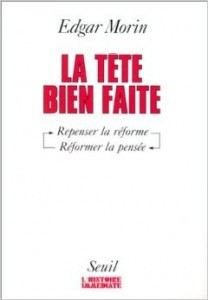 of the reform is the thought, and almost everything is framed in terms of modern thought or supposedly postmodern is in crisis.
of the reform is the thought, and almost everything is framed in terms of modern thought or supposedly postmodern is in crisis.
The book A well-made Edgar Morin Head is a brief formula, but hard, leaving a relatively simple point, say the educator, which suggested Jack Lang, the then Minister of Education in France, initially thought to make a ” manual for students, teachers and citizens “(Morin, p. 9) project that reformed and continued, proposed to overcome the current fragmentation of knowledge through complex thought, through a reform of thought through transdisciplinary teaching, capable of forming citizens planetariums, supportive and ethical, able to meet the challenges of the times.
Chapter I presents challenges, connecting knowledge in separate disciplines, proposing bringing them together in more polidisciplinares contents, cross, multidimensional, transnational, global, planetary (Morin, p.13).
Chapter 2 is the heart of the book, therefore entitled to well-made head, the philosopher Edgar Morin introduces Pascal’s quote “Do not teach men to be honest men, but it is taught everything else” is not a phrase by chance, but reveals the profound moral crisis we all face, not in Brazil but in planetary level, then where honest people can find refuge to face arrest.
In chapter chapter he explains how a general ability of intelligence, can become able to place and address problems of organized way and that makes it possible link between knowledge and giving them direction (p.21).
In chapter 3 the author deals with the human condition, subject already treated by Hannah Arendt and which is connected and part of the ontological resumed, but that depends not only on philosophical and literary reflections, but depends on the renewed and combined natural sciences, which are the subject little anthropocentric, but connected to home: Cosmology, Earth science and Ecology (p.35).
In this chapter the human being is revealed in its complexity: being, while being totally biological and cultural fully (p.40), then we could rethink the culture.
Chapter 4 Learning to live, Edgar Morin presents the thought of philosopher Emile Durkheim “the aim of education is not to transmit knowledge ever more numerous the student, but to create in him a deep and inner state, a kind of polarity spirit to guide you in a definite sense, not only during childhood but throughout life “(p.47), stop here because the thought reform is a revolution.
Operators continue to grow and bill in Brazil
The Telefónica group, its Brazilian affiliate owns Vivo, had already announced the capital increase to around 3 billion euros 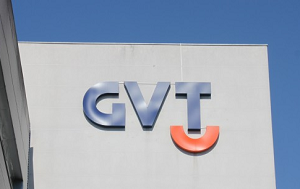 (around £ 9 billion) that was used to finance the close a deal with Brazilian operator GVT broadband French group Vivendi.
(around £ 9 billion) that was used to finance the close a deal with Brazilian operator GVT broadband French group Vivendi.
The purchase right with Vivendi is around 4.66 billion euros (close to US $ 15 billion) according to information on various vehicles in sight, which means about 12% of Brazil’s Telefonica, ie continue to earn easy money here.
Vivo had a little difficulty with CADE (Brazilian Administrative Council for Economic Defense), as there are concurrent operations of TIM in select cities in the state of São Paulo, and GVT entered a short time in this market but with aggressive pricing, but still cover and customer base is low, so that the combination does not yet guarantee an improvement in the service state SP.
So what’s the point of the acquisition of GVT, fixed operations of Vivo focus only in the state of São Paulo, integrating GVT to their business, she now has a presence in several cities in the country and will operate with pay-TV, fixed telephony , mobile and broadband, expanding the range of services.
Hopefully this will result in some increase in price and improvement of services.
Machiavelli and Machiavellian
By unstable political situations and imagine how it was possible makes them stable, Machiavelli living from 1969 to 1527, 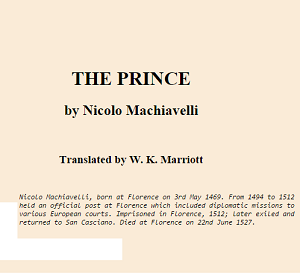 a period in which they establish the first stable governments in many small European states, but almost always ruled by a prince with absolute power, however , wrapped in big trouble and instability, this was the context in which Niccolo Machiavelli wrote his major work “The Prince” (1513).
a period in which they establish the first stable governments in many small European states, but almost always ruled by a prince with absolute power, however , wrapped in big trouble and instability, this was the context in which Niccolo Machiavelli wrote his major work “The Prince” (1513).
Machiavelli tries to answer relevant questions today: that vice and virtue are tolerated in rulers, appeals to humanity’s ruling as follows: all will say it is commendable find a prince only considered good qualities, among all those above, but not and you can own them, not fully observe them, because the human condition does not allow it, you need it to be as prudene you know escape the infamy of those vices that they would lose power: and if possible also avoid the vices that not you take power, but failing that, can leave them without giving them importance.
So while he admits beneficial addictions, he claims that an ordinary moral could lead to destruction of the State and Machiavelli admits political attitudes that may be considered addictions, but sees that there is a kind of addiction that is not acceptable to the State.
Simply put it is acceptable to any dose of favoritism due to the presence in the state of an ordinary person who has vices, but it is not acceptable that any kind of lack of morals is found in rulers because it can lead to destruction of the State.
To assess common men have to have clear criteria for judgment, things would be accepted in ordinary people and therefore tolerable in rulers and things which governments would not be admissible, thus says the author of the Prince: “There are qualities that have the appearance of virtue, but take the prince to ruin; and others, under the guise of addiction, produce their safety and their well-being “of course it’s good this political and not your pocket.
Those are not acceptable vices that to maintain wellness, destroy the welfare of the state and therefore of all the people, finally the art of government must have principles.

